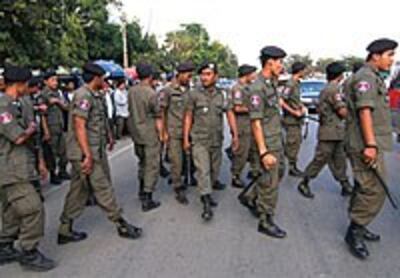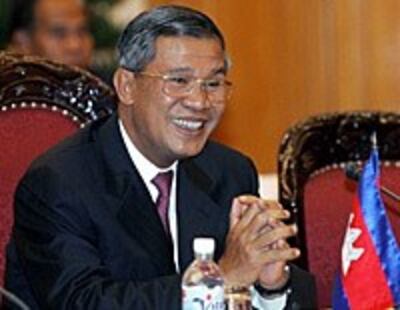
PHNOM PENH—Cambodian Prime Minister Hun Sen has defended a widening government crackdown on human rights activists, saying those arrested and charged with defaming him were being dealt with under the rule of law and that he himself was “just a victim.”
“I am just a victim, so let the court prosecute their cases, and it is up to the judges to make decisions,” the official Chinese news agency quoted Hun Sen as saying.
“The human rights workers had gone beyond the limit of their rights. For myself, personally, that is OK, but they even attacked the regime as a whole,” he said. “When they accuse this regime of being a dictatorial regime and want to topple this regime, what does that mean?”
“We only acted in accordance with the rule of law and of the courts. The government did not use force to arrest anyone and the issues of detention or charges or punishment are all up to the court to decide,” he said.
One man released on bail
Pa Nguon Tieng, deputy director of the Cambodian Center for Human Rights (CCHR), whose members are frequent and outspoken critics of the government, was detained last week and charged with criminal defamation against Hun Sen following questioning at the Phnom Penh Municipal Court.
CCHR director Kem Sokha was arrested in his office a few days earlier, and Yeng Vireak, head of the Legal Education Center, was arrested the previous week. Both men have also been charged with defaming Hun Sen. Yeng Vireak has subsequently been released on bail.
"I don't think I should have been arrested at all, because I cooperated with the government all along before my arrest. Neither did I have any connection to the banner," Yeng Vireak told RFA's Khmer service on his release.
The charges stem from a banner unfurled at an International Human Rights Day rally in December which accused Hun Sen of being a communist and a traitor who gave Cambodian land to neighboring Vietnam.
Kem Sokha has denied any connection to the banner, saying it was likely to have been planted by the government in the first place.
Yeng Vireak said he shared a crowded room with 15 other inmates at the prison where he and the others were held. Also there was independent broadcaster Mam Sonando. He said he was able to talk to Sonando and the others twice a day during exercise breaks.
The prison guards treated them well, although lack of cooling equipment and tropical heat made life uncomfortable, and inmates had no beds, sleeping on concrete floors. Kem Sokha's wife said his health was good, but that he was concerned about catching tuberculosis from other inmates.

Legal advice saved U.S. citizen
Ou Virak, a Cambodian-American activist who was present when Pa Nguon Tieng was arrested, said he had apparently escaped arrest following a call to the U.S. Embassy in Phnom Penh.
“I told the embassy I don’t know what I did wrong,” Ou Virak told RFA’s Khmer service. “And I asked the police for documents related to my arrest. The police ordered that I give my telephone to them, but I refused.”
“And the embassy also advised me not to give them the telephone unless they had a search warrant, which he did not have. I don’t know about the others. For myself, I called the U.S. Embassy and asked it for help,” he said.
Rights group says arrests politically motivated
Police confirmed the arrest, but did not say why he was being held.
Official government spokesman Khieu Kanarith has denied that politics has played any role in the arrests, instead claiming they are the product of a judicial system that is following the rule of law.
But Brad Adams, Asia director for the New York-based Human Rights Watch, dismissed the government’s claims in an interview with RFA’s Khmer service.
“If the law was going to be applied objectively, Hun Sen himself would already have been charged on many occasions,” Adams said. “He has made many statements over the years inciting people to violence. He has threatened foreign embassies, has threatened foreign governments, he has threatened opposition members.”
“So this is not a question of the law just being used neutrally. This is a question of the law being used as a tool against political opponents,” he said.
The U.S. government and the United Nations High Commissioner for Human Rights Louise Arbour have condemned the arrests.
Outspoken critic of regime
The U.S. State Department said the cumulative effect of the arrests was “to call into question the Cambodian government’s commitment to democracy and human rights.”
Arbour said the arrests formed a disturbing trend that threatened to undo progress made “over the last decade to build an open and just society based on the rule of law.”
“Hun Sen appears to be following the Burmese model by imprisoning peaceful critics of his increasingly authoritarian government,” Adams said in a statement carried on the group’s Web site.
“The arrest of human rights activists, as well as recent show trials of opposition politicians, is a throwback to the days when Hun Sen ran a one-party state,” Adams said.
According to Human Rights Watch, Hun Sen has long sought to silence Kem Sokha, one of Cambodia's most outspoken human rights activists. He has threatened to arrest him on numerous other occasions because of his criticism of the government.
Sokha was a member of the National Assembly (1993-98), where he chaired the Human Rights Commission, and later of the Senate (1999-2002).
In 2002, Sokha founded CCHR and started a popular radio program, “Voice of Democracy,” which provides a platform for Cambodians to criticize the government publicly.
According to international observers at the scene, CCHR’s office was surrounded and raided by around 50 uniformed and plainclothes police officers at 10:30 a.m. on Dec. 31.
On orders from Mok Chito, deputy chief of the Ministry of Interior Criminal Department, they presented a search warrant and summons to Sokha.
A representative of the U.S. Embassy and several local and international human rights groups, including Human Rights Watch, were present during the arrest.
CCHR’s “Voice of Democracy” was taken off the air for several hours. Beehive Radio was prevented from providing live coverage of the arrests.
Original reporting in Khmer by Jivita. RFA Khmer service director: Kem Sos. Written for the Web in English by Luisetta Mudie and Susan Lavery. Edited by Sarah Jackson-Han.
